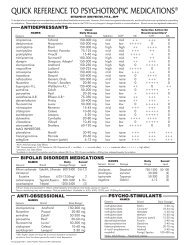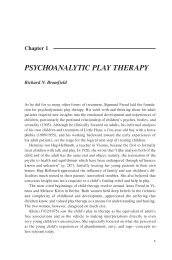IRAQ WAR CLINICIAN GUIDE
Iraq War Clinician's Guide - Network Of Care
Iraq War Clinician's Guide - Network Of Care
Create successful ePaper yourself
Turn your PDF publications into a flip-book with our unique Google optimized e-Paper software.
Iraq War Clinician Guide 191 Appendix I<br />
danger ("hypervigilance"); being startled easily, for example, when hearing a loud noise<br />
("exaggerated startle response"); and anxiety andpanic.<br />
Shutting down: Emotionalnumbing. When overwhelmed by strong emotions, the body and mind<br />
sometimes react by shutting down and becoming numb. The veteran may, as a result, have<br />
difficulty in experiencing loving feelings or feeling some emotions, especially when upset by<br />
traumatic memories. Like many of the other reactions to trauma, this emotional numbing reaction<br />
is not something the veteran is doing on purpose.<br />
Active avoidance of trauma-related thoughts and feelings. Painful memories and physical<br />
sensations of fear and activation can be frightening, so it is only natural to try and find ways to<br />
prevent them from happening. One way that most veterans try is to avoid anything - people,<br />
places, conversations, thoughts, emotions and feelings, physical sensations - that might act as a<br />
reminder of the trauma. This can be very helpful if it is used once in a while (e.g., avoiding<br />
upsetting news or television programs). But when it is used too much it can have two big negative<br />
effects. First, avoidance can reduce veterans' abilities to live their lives and enjoy themselves,<br />
because they can become isolated and limited in where they can go and what they can do.<br />
Second, avoiding thinking and feeling emotions connected with the trauma may reduce veterans'<br />
abilities to recover from it. It is through thinking about what happened, and particularly through<br />
talking about it with trusted others, that survivors may best deal with what has happened. By<br />
constantly avoiding thoughts, feelings, and discussions about the trauma, this potentially helpful<br />
process can be short-circuited.<br />
Depression. Most persons who have been traumatized experience depression. Feelings of<br />
depression then lead a person to think very negatively and feel hopeless. There is a sense of having<br />
lost things: one's previous self ("I'm not the same person I was"), sense of optimism and hope, selfesteem,<br />
and self-confidence. With time, and sometimes with the help of counseling, the trauma<br />
survivor can regain self-esteem, self-confidence, and hope. It is important to let others know about<br />
feelings of depression, and of course about any suicidal thoughts and feelings that are sometimes<br />
part of feeling depressed.<br />
Self-blame, guilt, andshame. Many veterans, in trying to make sense of their traumatic war<br />
experiences, blame themselves or feel guilty in some way. They may feel bad about some thin@<br />
they did or didn't do in the war zone. Feelings of guilt or self-blame cause much distress, and can<br />
prevent a person from reaching out for help. Therefore, even thought it is hard, it is very important<br />
to talk about guilt feelings with a counselor or doctor.<br />
Interpersonal effects. The many changes noted above can affect relationships with other people.<br />
Trauma may cause difficulties between a veteran and his or her partner, family, friends, or coworkers.<br />
The veteran who is experiencing high levels of irritability and anger may now have more<br />
conflicts with others and handle them less well. Particularly in close relationships, the emotional<br />
numbing and feelings of disconnection from others that are common after traumatic events may<br />
create distress and drive a wedge between the survivor and his or her family or close friends.<br />
Avoidance of different kinds of social activities by the survivor may frustrate family members.<br />
Sometimes, this avoidance results in social isolation that hurts relationships. Some kinds of<br />
traumatic experiences (e.g., sexual assault) can make it hard to trust other people. Friends and<br />
family may respond in ways that worsen the problem rather than help recovery. They may have<br />
difficulty understanding, become angry with the veteran, communicate poorly, andlor fail to<br />
provide support.<br />
,.,. <br />
DEPARTMENT OF VETERANS AFFAIRS<br />
NATIONAL CENTER FOR PTSD




